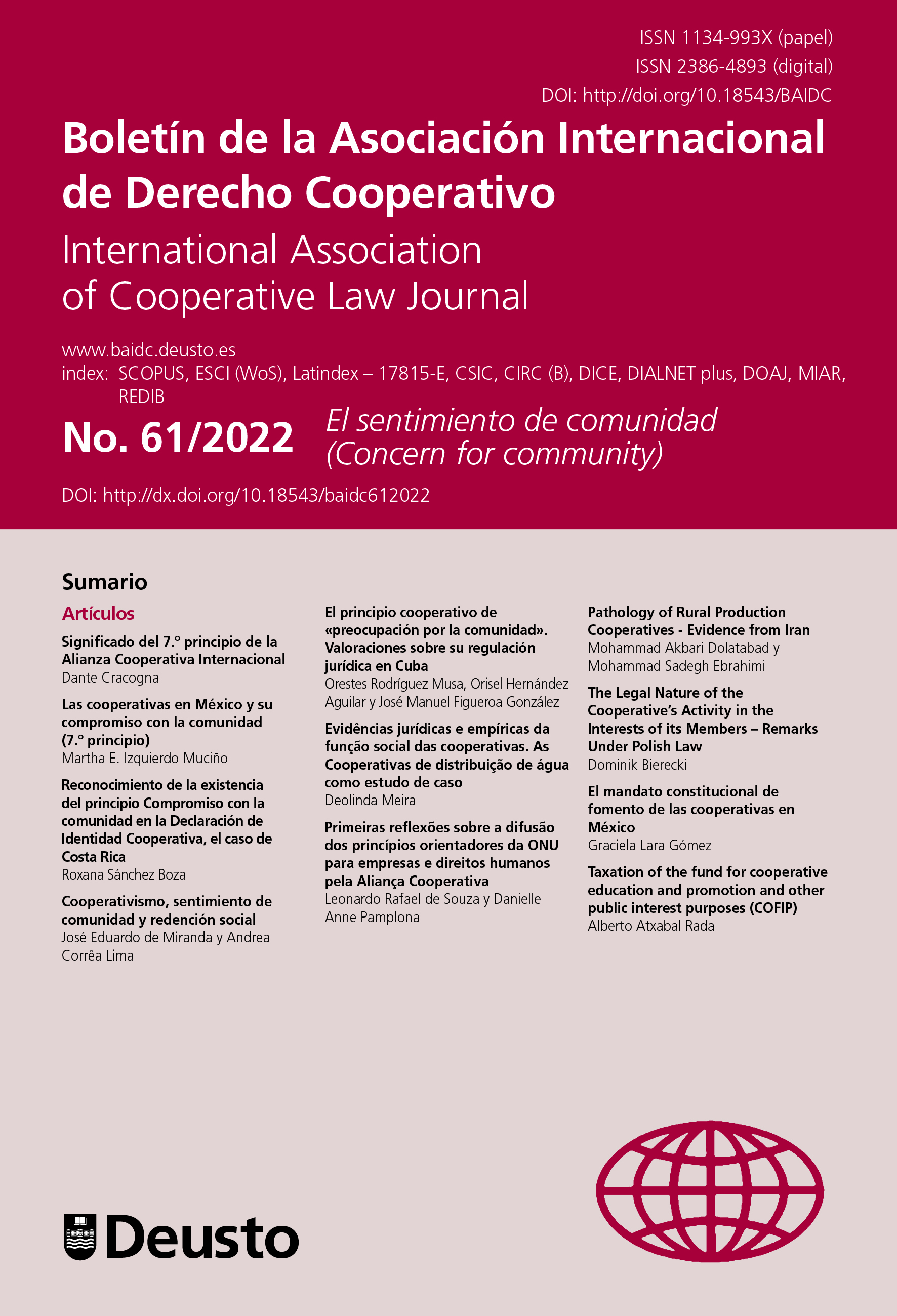Patología de las Cooperativas de Producción Rural – Evidencia de Irán
Resumen
Las empresas cooperativas de producción rural son uno de los tipos más importantes de sistema cooperativo en Irán. Sus actividades se han iniciado desde 1963. Parece que este sistema de cultivo no ha sido capaz de convertirse en una fuente de desarrollo positivo hasta la fecha. El presente estudio busca evaluar la patología de las cooperativas de producción rural. La población estadística de esta investigación es de 55 cooperativas rurales de la provincia de Isfahan con 21213 miembros, de las cuales 41 cooperativas con 16870 miembros están activas. El método de recolección de información fue documental y encuesta. La información requerida para esta investigación se ha recopilado mediante el método de la biblioteca, así como mediante entrevistas y cuestionarios. El método de muestreo se clasificó aleatoriamente en función del número de socios de cada cooperativa en función del tamaño de la muestra. Con base en la fórmula de Cochran, se seleccionaron 217 muestras de socios y 98 muestras de gerentes de empresas cooperativas de producción. Los resultados de la investigación muestran que las cooperativas de producción rural no han tenido mucho éxito. La patología de las causas del fracaso de estas cooperativas muestra que factores como las características psicológicas de los socios, Las características gerenciales desfavorables, así como factores sociales como la confianza en la participación, influyen en el desempeño inadecuado de las cooperativas. Además, los resultados de la investigación muestran que la educación no ha logrado que las cooperativas sean más efectivas. Asimismo, la falta de capital social es la principal razón de la ineficiencia de este tipo de cooperativas de producción.
Recibido: 22 december 2021
Aceptado: 28 october 2022
Descargas
Citas
ABEBAW, D and HAILE, M. G. 2013. The impact of cooperatives on agricultural technology adoption: Empirical evidence from Ethiopia. Food Policy 38(1): 82-91. http://www.sciencedirect.com/science/article/pii/S0306919212001030
ALSTON, J. M., and PARDEY, P. G. 2014. Agriculture in the global economy. J. Eco. Perspect. 28(1): 121-146.
ARAYESH, M.B. 2017. The Relationship between Extension Educational and Psychological Factors and Participation of Agricultural Cooperatives’ Members (Case of Shirvan Chardavol County, Ilam, Iran). International Journal of Agricultural Management and Development (IJAMAD), 7(1):79-87.
AREF, F. 2011. Agricultural Cooperatives for Agricultural Development in Iran. Life Science Journal. 8: 82-85.
BIGLERI, N., Medicine Rad, Gh. 2013. And when you thought, n.º Strategies for Empowering Production Cooperatives from the Perspective of National and Provincial Experts, Economic Research and Agricultural Development of Iran 1 (44): 113-103.
BOUDLAIE, H., BOGHOSIAN, A and PANJALI, H.M. 2018. The impact of corporate social responsibility and internal marketing on employee turnover intentions with the mediating role of organizational commitment, 15(4): 29-44.
BRISCOE, T. 2010. Making worker cooperatives effective in South Pacific. J. Pacific. Stud. 16: 243-248.
CELIK, A., METIN, I. and CELIK, M. 2012. Taking a photo of Turkish fishery sector: a swot analysis. Procedia Soc. Behav. Sci. 58: 1515-1524.
CENTRAL ORGANIZATION OF RURAL COOPERATIVES OF IRAN. 2019. Systems of formation and establishment of cooperatives of rural production, agricultural joint stock, agriculture and industry in the agricultural sector (first edition), Asrar Alam Publications, Tehran.
DELGADO, C. 2007. Agro industrialization through institutional innovation: Transaction Costs, Co-operatives and Milk-Market Development in the Ethiopian highlands. Int. Food Policy Res. 1:101-110.
DERR, J. B. 2013. The Co-operative movement of Brazil and South Africa. Sustainable Development, 1, 1-14.
EBRAHIMI, Mohammad Sadegh, and MOJTABA GHAEDIYAN. 2021. “Corporate social responsibility and organizational commitment in agricultural cooperatives: evidence from Iran”. International Association of Cooperative Law Journal, no. 59 (December), 263-83. https://doi.org/10.18543/baidc-59-2021pp263-283.
EFTEKHARI, A., PORTAHERI, M., FARAJZADEH, M. and lawyer HEYDARI, S. 2009. The Role of Empowerment in Agricultural Development, Case Study: Ardabil Province, Human Geography Research 69: 103-87.
FARYABI, M., AHMADVAND, M. 2017. The Determinants of Rural Production Cooperatives’ Performance in South of Kerman Province. Journal of Rural Research, 8(3), 404-421. DOI: https://doi.org/10.22059/jrur.2017.63474.
GARNEVSKAA, E., LIUB, G. and SHADBOLT, N. M. 2011. Factors for successful development of farmer cooperatives in northwest china. International Food and Agribusiness Manage. Rev. 14 (4): 69-84.
GOLLIN, D. 2010. Agricultural productivity and economic growth, handbook of agricultural economics 4: 3825-3866.
GULEN, O. 2013. Women’s cooperatives in Turkey. Procedia Soc. Behar. Sci. 81: 300-305. http://www.sciencedirect.com/science/article/pii/S1877042813014997
GRASHUS, J and SU, Y. 2018. A review of the empirical literature on farmer cooperatives: performance, ownership and governance, finance and member attitude. Annals of Public and Cooperative Economics, 12(4): 77-102.
HEIDARI, F., NADERI MEHDI, K., YAGHOUBI FARANI, A. and HEYDARI, A. 2015. Identification indicators of successful agricultural cooperatives, Quarterly Journal of Cooperatives and Agriculture 4 (14): 60-39.
ICA. 2016. SUSTAINABILITY REPORTING FOR CO-OPERATIVES: A GUIDEBOOK, International Cooperative Alliance, March, p. 32.
KALANTARI, Khalil. 2018. Data processing and analysis in economic and social research. Sharif Publications.
KHOSRAVIPOUR, B. and AHMADI, M. 2017. Rural Production Cooperatives (Challenges and Strategies). Management and Entrepreneurship Studies, 3(4-1): 69-82.
MOHAMMED, N. and LEE, B. W. 2015. Role of cooperatives in rural development, the case of south nation’s nationalities and people region, Ethiopia. Sci .J. Bus. Manage 3(4): 102-108.
NAJAFI, M., NORI, H and AMINI, A. 2019. Assessing the Role of Management in Performance of Rural Production Cooperatives: (A Case Study of Isfahan Province). Iranian Journal of Agricultural Economics and Development Research. 50(3): 531-547.
NEKOUEI NAIENI, S., GHANBARI, Y., BARGHI, H. 2019. Assessing the Stability of Farming System in Rural Production Cooperatives in Isfahan Province and the Effective Strategies to Achieve it. Journal of Research and Rural Planning, 8(1), 111-126. DOI: https://doi.org/10.22067/jrrp.v8i1.72976
NORUZI, M. R and WESTOVER, J. H. 2010. Opportunities, Challenges and Employment Relative Advantages in the Cooperative Sector in Iran. Management Science and Engineering, 4(3): 10-18.
SADIGHI, H and DARVISHINIA, H. 2005. Farmers’ Professional Satisfaction with the Rural Production Cooperative Approach. J. Agric. Sci. Technol. 7: 1-8.
SARMAD, Z., AS, BAZARGAN. and A., HEJAZI. 2017. Research methods in behavioral sciences. Agah Publications.
SIEGAL, G. 2010. Toward a model rural development quarterly. J. Soc. Econ. Dev. 5(12):106-117.
VINK, N. 2012. The long-term economic consequences of agricultural marketing legislation in South Africa. South African Journal of Economics, 80(4), 553-566
WORLD CO-OPERATIVE MONITOR. 2017. Exploring the Co-operative economy, Eurisce-ICA.
WOSSEN, T., T. ABDOULAYE, A. ALENE, M. HAILE, S. FELEKE, A. OLANREWAJU and MANYONG, T. 2017. Impacts of extension access and cooperative membership on technology adoption and household welfare. J. Rural Stud. 54: 223-233. http://www.sciencedirect.com/science/article/pii/S0743016716302790
ZARE SHAHABADI, A., HAJIZADEH MEYMANDI, M. And MOBILE KHALAJ, H. 2015. Socio-Cultural Factors Related to the Success of Production Cooperatives in Yazd, Social Development Quarterly 10 (1): 156-127.
Derechos de autor 2022 Universidad de Deusto

Esta obra está bajo licencia internacional Creative Commons Reconocimiento-NoComercial 4.0.
El/la autor/a, mediante la entrega de sus manuscritos al Boletín de la Asociación Internacional de Derecho Cooperativo (BAIDC), acepta las condiciones que se detallan a continuación sobre derechos de autor/a y se compromete a cumplirlas.
1. Cesión de derechos
La Editorial (Universidad de Deusto) conserva los derechos de autor/a de esta publicación.
Mediante la entrega de sus manuscritos al Boletín de la Asociación Internacional de Derecho Cooperativo (BAIDC), sin la firma de ningún documento de cesión, el/la autor/a cede libre de pago a la Editorial (Universidad de Deusto) los derechos de distribución, comunicación pública y reproducción del trabajo que somete a publicación en el Boletín de la Asociación Internacional de Derecho Cooperativo (BAIDC) en cualquier tipo de soporte, ahora conocidos o desarrollados en el futuro, para los propósitos educativos y académicos incluida la cesión para su inclusión en las bases de datos en las que esta revista está indexada.
2. Autoría
El/la autor/a debe ser el/la único/a creador/a de la obra o debe actuar legalmente en nombre y con el pleno acuerdo de todos/as los/as co-autores/as.
Los/as autores/as deberán asegurarse en su caso de que todos los/as coautores/as estén debidamente incluidos, y que no haya ninguna persona mencionada como autora indebidamente. Igualmente, todos/as los/as autores/as deberán haber visto y aprobado la versión final del trabajo y su envío para su publicación.
Para evitar el riesgo de autoría ficticia o usurpada, se recomienda que, en el momento de enviar el documento, todas las autorías se pongan de acuerdo en sus aportaciones y en el orden en que aparecerán en la lista de coautores/as.
El/la autor/a garantiza que no se han otorgado ni se otorgarán permisos o licencias de cualquier tipo que puedan violar los derechos otorgados a la Editorial (Universidad de Deusto).
El/la autor/a asume la responsabilidad de obtener todos los permisos necesarios para la reproducción en sus manuscritos de cualquier texto, material o ilustración, proveniente de otro/a autor/a, institución o publicación.
3. Derecho de autor/a y Código de conducta
El/la autor/a garantiza que su trabajo es original; que no ha sido publicado en cualquier forma anteriormente; que no está preparando su publicación en otra parte; que su envío y publicación no violan las directrices éticas de la Revista (BAIDC) ni los códigos de conducta, leyes o derechos de cualquier tercero.
4. Difusión en régimen de Acceso Abierto (Open Access)
El acceso al contenido digital de cualquier número del Boletín de la Asociación Internacional de Derecho Cooperativo (BAIDC) es gratuito, en régimen de Acceso Abierto (Open Access). Los trabajos podrán leerse, descargarse, copiar y difundir, sin fines comerciales inmediatamente después de su publicación, sin la previa autorización del editor o el autor, siempre que la obra original sea debidamente citada y cualquier cambio en el original esté claramente indicado.
5. Redifusión del artículo por el/la autor/a
El/la autor/a tiene el derecho a presentar, exhibir, distribuir, desarrollar y publicar su trabajo, siempre que indique con claridad y en la primera nota a pie de página que el trabajo se publicó por primera vez en el Boletín de la Asociación Internacional de Derecho Cooperativo, con indicación del número, año, páginas y DOI (si procede).
Aviso legal
Cualquier uso del artículo contrario a las reglas anteriores en cualquier medio o formato, ahora conocido o desarrollado en el futuro, requiere el permiso previo por escrito del titular de los derechos de autor/a.
Las consecuencias que puedan derivarse de denuncias por publicación de artículos plagiados serán responsabilidad exclusiva del/de la autor/a.


.jpg)
.jpg)
.jpg)
.jpg)
.jpg)
.jpg)






